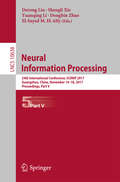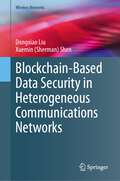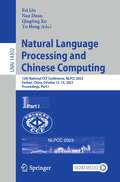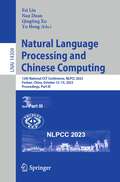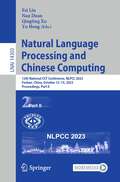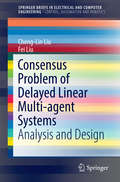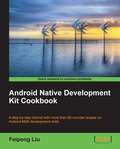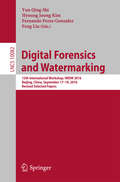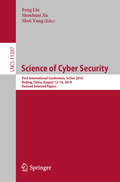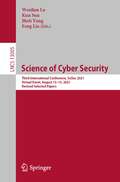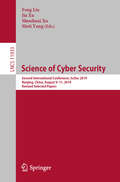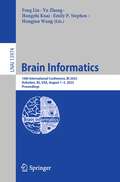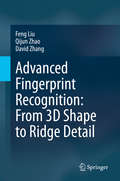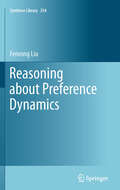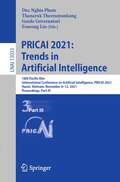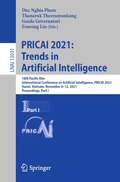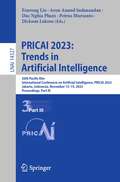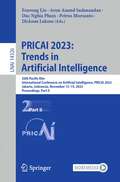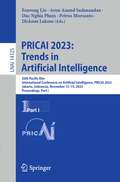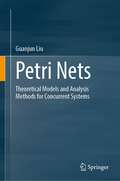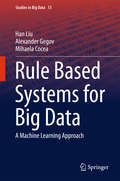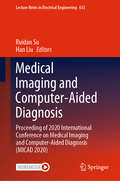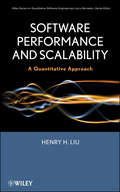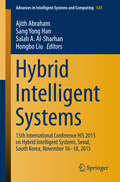- Table View
- List View
Neural Information Processing: 24th International Conference, ICONIP 2017, Guangzhou, China, November 14–18, 2017, Proceedings, Part V (Lecture Notes in Computer Science #10638)
by Derong Liu Shengli Xie Yuanqing Li Dongbin Zhao El-Sayed M. El-AlfyThe six volume set LNCS 10634, LNCS 10635, LNCS 10636, LNCS 10637, LNCS 10638, and LNCS 10639 constitues the proceedings of the 24rd International Conference on Neural Information Processing, ICONIP 2017, held in Guangzhou, China, in November 2017. The 563 full papers presented were carefully reviewed and selected from 856 submissions. The 6 volumes are organized in topical sections on Machine Learning, Reinforcement Learning, Big Data Analysis, Deep Learning, Brain-Computer Interface, Computational Finance, Computer Vision, Neurodynamics, Sensory Perception and Decision Making, Computational Intelligence, Neural Data Analysis, Biomedical Engineering, Emotion and Bayesian Networks, Data Mining, Time-Series Analysis, Social Networks, Bioinformatics, Information Security and Social Cognition, Robotics and Control, Pattern Recognition, Neuromorphic Hardware and Speech Processing.
Blockchain-Based Data Security in Heterogeneous Communications Networks (Wireless Networks)
by Dongxiao Liu Xuemin (Sherman) ShenThis book investigates data security approaches in Heterogeneous Communications Networks (HCN). First, the book discusses the urgent need for a decentralized data management architecture in HCN. The book investigates preliminaries and related research to help readers obtain a comprehensive picture of the research topic. Second, the book presents three blockchain-based approaches for data management in HCN: data provenance, data query, and data marketing. Finally, based on the insights and experiences from the presented approaches, the book discusses future research directions.
Natural Language Processing and Chinese Computing: 12th National CCF Conference, NLPCC 2023, Foshan, China, October 12–15, 2023, Proceedings, Part I (Lecture Notes in Computer Science #14302)
by Fei Liu Nan Duan Qingting Xu Yu HongThis three-volume set constitutes the refereed proceedings of the 12th National CCF Conference on Natural Language Processing and Chinese Computing, NLPCC 2023, held in Foshan, China, during October 12–15, 2023. The 143 regular papers included in these proceedings were carefully reviewed and selected from 478 submissions. They were organized in topical sections as follows: dialogue systems; fundamentals of NLP; information extraction and knowledge graph; machine learning for NLP; machine translation and multilinguality; multimodality and explainability; NLP applications and text mining; question answering; large language models; summarization and generation; student workshop; and evaluation workshop.
Natural Language Processing and Chinese Computing: 12th National CCF Conference, NLPCC 2023, Foshan, China, October 12–15, 2023, Proceedings, Part III (Lecture Notes in Computer Science #14304)
by Fei Liu Nan Duan Qingting Xu Yu HongThis three-volume set constitutes the refereed proceedings of the 12th National CCF Conference on Natural Language Processing and Chinese Computing, NLPCC 2023, held in Foshan, China, during October 12–15, 2023. The ____ regular papers included in these proceedings were carefully reviewed and selected from 478 submissions. They were organized in topical sections as follows: dialogue systems; fundamentals of NLP; information extraction and knowledge graph; machine learning for NLP; machine translation and multilinguality; multimodality and explainability; NLP applications and text mining; question answering; large language models; summarization and generation; student workshop; and evaluation workshop.
Natural Language Processing and Chinese Computing: 12th National CCF Conference, NLPCC 2023, Foshan, China, October 12–15, 2023, Proceedings, Part II (Lecture Notes in Computer Science #14303)
by Fei Liu Nan Duan Qingting Xu Yu HongThis three-volume set constitutes the refereed proceedings of the 12th National CCF Conference on Natural Language Processing and Chinese Computing, NLPCC 2023, held in Foshan, China, during October 12–15, 2023. The ____ regular papers included in these proceedings were carefully reviewed and selected from 478 submissions. They were organized in topical sections as follows: dialogue systems; fundamentals of NLP; information extraction and knowledge graph; machine learning for NLP; machine translation and multilinguality; multimodality and explainability; NLP applications and text mining; question answering; large language models; summarization and generation; student workshop; and evaluation workshop.
Consensus Problem of Delayed Linear Multi-agent Systems: Analysis and Design (SpringerBriefs in Electrical and Computer Engineering)
by Fei Liu Cheng-Lin LiuIn the context of coupled-coordination control mechanisms, this book focuses on the delay robustness of consensus problems with asynchronously coupled and synchronously coupled consensus algorithms respectively. Moreover, constructive consensus algorithms that tolerate larger communication delays are proposed according to idea of compensation. By providing rigorous theoretical proofs and numerous numerical simulations, it enhances readers' understanding of the consensus coordination control mechanism of multi-agent systems with communication delays.
Android Native Development Kit Cookbook
by Feipeng LiuThis book is written in a Cookbook style, beginning with recipes which focus on helping developers make their software/application available in Android.Android developers who want to learn Android NDK programming, or develop multimedia and games in Android NDK will benefit from this book
Digital Forensics and Watermarking
by Feng Liu Fernando Perez-Gonzalez Hyoung Joong Kim Yun Qing ShiThis book constitutes revised selected papers from the 14th International Workshop on Digital-Forensics and Watermarking, IWDW 2015, held in Tokyo, Japan, in October 2015. The 35 papers presented in this volume were carefully reviewed and selected from 54 submissions. The contributions are organized in topical sections named: digital forensics; steganography and steganalysis; digital watermarking; reversible data hiding; and visual cryptography.
Science of Cyber Security: First International Conference, SciSec 2018, Beijing, China, August 12-14, 2018, Revised Selected Papers (Lecture Notes in Computer Science #11287)
by Feng Liu Shouhuai Xu Moti YungThis book constitutes the proceedings of the First International Conference on Science of Cyber Security, SciSec 2018, held in Beijing, China, in August 2018.The 11 full papers and 6 short papers presented in this volume were carefully reviewed and selected from 54 submissions. The papers focus on science of security; cybersecurity dynamics; attacks and defenses; network security; security metrics and measurements; and performance enhancements.
Science of Cyber Security: Third International Conference, SciSec 2021, Virtual Event, August 13–15, 2021, Revised Selected Papers (Lecture Notes in Computer Science #13005)
by Feng Liu Moti Yung Kun Sun Wenlian LuThis book constitutes the proceedings of the Third International Conference on Science of Cyber Security, SciSec 2021, held in Shanghai, China, in August 2021.The 17 full papers and 5 short papers presented in this volume were carefully reviewed and selected from 50 submissions. These papers cover the following subjects: Cyber Security, Detection, Machine Learning and much more.
Science of Cyber Security: Second International Conference, SciSec 2019, Nanjing, China, August 9–11, 2019, Revised Selected Papers (Lecture Notes in Computer Science #11933)
by Feng Liu Moti Yung Shouhuai Xu Jia XuThis book constitutes the proceedings of the Second International Conference on Science of Cyber Security, SciSec 2019, held in Nanjing, China, in August 2019. The 20 full papers and 8 short papers presented in this volume were carefully reviewed and selected from 62 submissions. These papers cover the following subjects: Artificial Intelligence for Cybersecurity, Machine Learning for Cybersecurity, and Mechanisms for Solving Actual Cybersecurity Problems (e.g., Blockchain, Attack and Defense; Encryptions with Cybersecurity Applications).
Brain Informatics: 16th International Conference, BI 2023, Hoboken, NJ, USA, August 1–3, 2023, Proceedings (Lecture Notes in Computer Science #13974)
by Feng Liu Yu Zhang Hongzhi Kuai Emily P. Stephen Hongjun WangThis book constitutes the proceedings of the 16th International Conference on Brain Informatics, BI 2023, which was held in Hoboken, NJ, USA, during August 1–3, 2023.The 40 full papers presented in this book were carefully reviewed and selected from 101 submissions. The papers are divided into the following topical sections: cognitive and computational foundations of brain science; investigations of human Information processing systems; brain big data analytics, curation and management; informatics paradigms for brain and mental health research; brain-machine intelligence and brain-inspired computing; and the 5th international workshop on cognitive neuroscience of thinking and reasoning.
Advanced Fingerprint Recognition: From 3D Shape to Ridge Detail
by Feng Liu Qijun Zhao David ZhangFingerprints are among the most widely used biometric modalities and have been successfully applied in various scenarios. For example, in forensics, fingerprints serve as important legal evidence; and in civilian applications, fingerprints are used for access and attendance control as well as other identity services. Thanks to advances in three-dimensional (3D) and high-resolution imaging technology, it is now feasible to capture 3D or high-resolution fingerprints to provide extra information and go beyond the traditional features such as global ridge patterns and local ridge singularities used in conventional fingerprint recognition tasks. This book presents the state of the art in the acquisition and analysis of 3D and high-resolution fingerprints. Based on the authors’ research, this book focuses on advanced fingerprint recognition using 3D fingerprint features (i.e., finger shape, level 0 features) or high-resolution fingerprint features (i.e., ridge detail, level 3 features). It is a valuable resource for researchers, professionals and graduate students working in the field of computer vision, pattern recognition, security/biometrics practice, as well as interdisciplinary researchers.
Reasoning about Preference Dynamics
by Fenrong LiuOur preferences determine how we act and think, but exactly what the mechanics are and how they work is a central cause of concern in many disciplines. This book uses techniques from modern logics of information flow and action to develop a unified new theory of what preference is and how it changes. The theory emphasizes reasons for preference, as well as its entanglement with our beliefs. Moreover, the book provides dynamic logical systems which describe the explicit triggers driving preference change, including new information, suggestions, and commands. In sum, the book creates new bridges between many fields, from philosophy and computer science to economics, linguistics, and psychology. For the experienced scholar access to a large body of recent literature is provided and the novice gets a thorough introduction to the action and techniques of dynamic logic.
PRICAI 2021: 18th Pacific Rim International Conference on Artificial Intelligence, PRICAI 2021, Hanoi, Vietnam, November 8–12, 2021, Proceedings, Part III (Lecture Notes in Computer Science #13033)
by Fenrong Liu Guido Governatori Thanaruk Theeramunkong Duc Nghia PhamThis three-volume set, LNAI 13031, LNAI 13032, and LNAI 13033 constitutes the thoroughly refereed proceedings of the 18th Pacific Rim Conference on Artificial Intelligence, PRICAI 2021, held in Hanoi, Vietnam, in November 2021.The 93 full papers and 28 short papers presented in these volumes were carefully reviewed and selected from 382 submissions. PRICAI covers a wide range of topics in the areas of social and economic importance for countries in the Pacific Rim: artificial intelligence, machine learning, natural language processing, knowledge representation and reasoning, planning and scheduling, computer vision, distributed artificial intelligence, search methodologies, etc. Part III includes two thematic blocks: Reinforcement Learning, followed by Vision and Perception.
PRICAI 2021: 18th Pacific Rim International Conference on Artificial Intelligence, PRICAI 2021, Hanoi, Vietnam, November 8–12, 2021, Proceedings, Part I (Lecture Notes in Computer Science #13031)
by Fenrong Liu Guido Governatori Thanaruk Theeramunkong Duc Nghia PhamThis three-volume set, LNAI 13031, LNAI 13032, and LNAI 13033 constitutes the thoroughly refereed proceedings of the 18th Pacific Rim Conference on Artificial Intelligence, PRICAI 2021, held in Hanoi, Vietnam, in November 2021.The 93 full papers and 28 short papers presented in these volumes were carefully reviewed and selected from 382 submissions. PRICAI covers a wide range of topics in the areas of social and economic importance for countries in the Pacific Rim: artificial intelligence, machine learning, natural language processing, knowledge representation and reasoning, planning and scheduling, computer vision, distributed artificial intelligence, search methodologies, etc. Part I includes the following topical headings: AI Foundations / Decision Theory, Applications of AI, Data Mining and Knowledge Discovery, Evolutionary Computation / Optimisation, Knowledge Representation and Reasoning.
PRICAI 2023: 20th Pacific Rim International Conference on Artificial Intelligence, PRICAI 2023, Jakarta, Indonesia, November 15–19, 2023, Proceedings, Part III (Lecture Notes in Computer Science #14327)
by Fenrong Liu Arun Anand Sadanandan Duc Nghia Pham Petrus Mursanto Dickson LukoseThis three-volume set, LNCS 14325-14327 constitutes the thoroughly refereed proceedings of the 20th Pacific Rim Conference on Artificial Intelligence, PRICAI 2023, held in Jakarta, Indonesia, in November 2023.The 95 full papers and 36 short papers presented in these volumes were carefully reviewed and selected from 422 submissions. PRICAI covers a wide range of topics in the areas of social and economic importance for countries in the Pacific Rim: artificial intelligence, machine learning, natural language processing, knowledge representation and reasoning, planning and scheduling, computer vision, distributed artificial intelligence, search methodologies, etc.
PRICAI 2023: 20th Pacific Rim International Conference on Artificial Intelligence, PRICAI 2023, Jakarta, Indonesia, November 15–19, 2023, Proceedings, Part II (Lecture Notes in Computer Science #14326)
by Fenrong Liu Arun Anand Sadanandan Duc Nghia Pham Petrus Mursanto Dickson LukoseThis three-volume set, LNCS 14325-14327 constitutes the thoroughly refereed proceedings of the 20th Pacific Rim Conference on Artificial Intelligence, PRICAI 2023, held in Jakarta, Indonesia, in November 2023.The 95 full papers and 36 short papers presented in these volumes were carefully reviewed and selected from 422 submissions. PRICAI covers a wide range of topics in the areas of social and economic importance for countries in the Pacific Rim: artificial intelligence, machine learning, natural language processing, knowledge representation and reasoning, planning and scheduling, computer vision, distributed artificial intelligence, search methodologies, etc.
PRICAI 2023: 20th Pacific Rim International Conference on Artificial Intelligence, PRICAI 2023, Jakarta, Indonesia, November 15–19, 2023, Proceedings, Part I (Lecture Notes in Computer Science #14325)
by Fenrong Liu Arun Anand Sadanandan Duc Nghia Pham Petrus Mursanto Dickson LukoseThis three-volume set, LNCS 14325-14327 constitutes the thoroughly refereed proceedings of the 20th Pacific Rim Conference on Artificial Intelligence, PRICAI 2023, held in Jakarta, Indonesia, in November 2023.The 95 full papers and 36 short papers presented in these volumes were carefully reviewed and selected from 422 submissions. PRICAI covers a wide range of topics in the areas of social and economic importance for countries in the Pacific Rim: artificial intelligence, machine learning, natural language processing, knowledge representation and reasoning, planning and scheduling, computer vision, distributed artificial intelligence, search methodologies, etc.
Petri Nets: Theoretical Models and Analysis Methods for Concurrent Systems
by Guanjun LiuThis book provides essential information on Petri net theory and Petri net-based model checking methods. As for the Petri net theory, it involves the interleaving semantics and concurrency semantics of elementary net systems, some important net structures (e.g., invariant, repetitive vector, siphon, and trap), some classical net subclasses with special structures (e.g., state machine, marked graph, free-choice net,asymmetric-choice net, normal net, and weakly persistent net), and some basic properties (e.g., reachability, liveness, deadlock, and soundness). It also involves four high-level Petri nets: knowledge-oriented Petri nets, Petri nets with insecure places, time Petri nets, and plain time Petri nets with priorities, focusing on different fields of application. As for the model checking methods, this book introduces readers to computation tree logic (CTL), computation tree logic of knowledge (CTLK), and timed computation tree logic (TCTL), as well as Petri net-based methods for checking them. The basic principle of the reduced ordered binary decision diagram (ROBDD) is employed to compress the state space used in these model checking procedures. The book also covers time-soundness for time Petri nets and secure bisimulation for Petri nets with insecure places, both of which are based on the bisimulation theory. As such, it offers an introduction to basic information on bisimulation theory.
Rule Based Systems for Big Data
by Han Liu Alexander Gegov Mihaela CoceaThe ideas introduced in this book explore the relationships among rule based systems, machine learning and big data. Rule based systems are seen as a special type of expert systems, which can be built by using expert knowledge or learning from real data. The book focuses on the development and evaluation of rule based systems in terms of accuracy, efficiency and interpretability. In particular, a unified framework for building rule based systems, which consists of the operations of rule generation, rule simplification and rule representation, is presented. Each of these operations is detailed using specific methods or techniques. In addition, this book also presents some ensemble learning frameworks for building ensemble rule based systems.
Medical Imaging and Computer-Aided Diagnosis: Proceeding of 2020 International Conference on Medical Imaging and Computer-Aided Diagnosis (MICAD 2020) (Lecture Notes in Electrical Engineering #633)
by Han Liu Ruidan SuThis book covers virtually all aspects of image formation in medical imaging, including systems based on ionizing radiation (x-rays, gamma rays) and non-ionizing techniques (ultrasound, optical, thermal, magnetic resonance, and magnetic particle imaging) alike. In addition, it discusses the development and application of computer-aided detection and diagnosis (CAD) systems in medical imaging. Given its coverage, the book provides both a forum and valuable resource for researchers involved in image formation, experimental methods, image performance, segmentation, pattern recognition, feature extraction, classifier design, machine learning / deep learning, radiomics, CAD workstation design, human–computer interaction, databases, and performance evaluation.
Oracle Database Performance and Scalability: A Quantitative Approach (Quantitative Software Engineering Series #12)
by Henry H. LiuThe innovative performance and scalability features with each newer edition of the Oracle database system can present challenges for users. This book teaches software developers and students how to effectively deal with Oracle performance and scalability issues throughout the entire life cycle of developing Oracle-based applications. Using real-world case studies to deliver key theories and concepts, the book introduces highly dependable and ready-to-apply performance and scalability optimization techniques, augmented with Top 10 Oracle Performance and Scalability Features as well as a supplementary support website.
Software Performance and Scalability: A Quantitative Approach
by Henry H. LiuThe Basics -introduces the computer hardware and software architectures that predetermine the performance and scalability of a software product as well as the principles of measuring the performance and scalability of a software product Queuing Theory -helps you learn the performance laws and queuing models for interpreting the underlying physics behind software performance and scalability, supplemented with ready-to-apply techniques for improving the performance and scalability of a software system API Profiling -shows you how to design more efficient algorithms and achieve optimized performance and scalability, aided by adopting an API profiling framework (perfBasic) built on the concept of a performance map for drilling down performance root causes at the API level Software Performance and Scalability gives you a specialized skill set that will enable you to design and build performance into your products with immediate, measurable improvements. Complemented with real-world case studies, it is an indispensable resource for software developers, quality and performance assurance engineers, architects, and managers. It is anideal text for university courses related to computer and software performance evaluation and can also be used to supplement a course in computer organization or in queuing theory for upper-division and graduate computer science students.
Hybrid Intelligent Systems
by Hongbo Liu Salah A. Al-Sharhan Sang Yong Han Ajith AbrahamThis bookis devoted to the hybridization of intelligent systems which is a promisingresearch field of modern computational intelligence concerned with thedevelopment of the next generation of intelligent systems. This Volume containsthe papers presented in the Fifteenth International conference on HybridIntelligent Systems (HIS 2015) held in Seoul, South Korea during November 16-18, 2015. The 26 papers presented in this Volume were carefully reviewed andselected from 90 paper submissions. The Volume will be a valuable referenceto researchers, students and practitioners in the computational intelligencefield.
